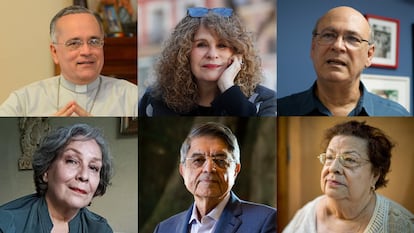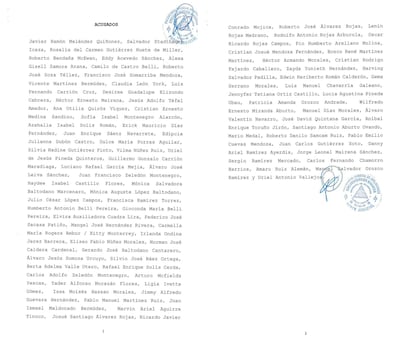Ortega strips another 94 Nicaraguans of their nationality, including writers Sergio Ramirez and Gioconda Belli
The Nicaraguan justice system has also stripped journalist Carlos Fernando Chamorro, Bishop Silvio Báez, feminist Sofía Montenegro and human rights defender Vilma Núñez of their citizenship


Daniel Ortega’s regime stripped another 94 people of their Nicaraguan nationality on Wednesday. Among those affected are exiled writers Sergio Ramírez, winner of the Cervantes Prize, and Gioconda Belli; Nicaraguan journalist Carlos Fernando Chamorro; writer and feminist Sofía Montenegro; Bishop Silvio Báez, one of the most critical voices from the Church; and activist Vilma Núñez, who is the president of the Nicaraguan Center for Human Rights (CNDH). The decision was notified by the president of the Court of Appeals of Managua, Ernesto Rodriguez. According to the ruling, the affected persons are charged with “treason” and are considered “fugitives.” In addition to revoking their Nicaraguan nationality, the justice system – which is under Ortega’s control – ordered all properties owned by the affected persons to be seized. Journalist Wilfredo Miranda, a contributor to EL PAÍS, is also one of the 94 people who have been stripped of their nationality.
The decision comes a week after the regime ordered the expulsion of 222 political prisoners from Nicaragua, who were also stripped of their nationality. Last Thursday, the freed prisoners were transported on a US chartered plane to a hotel in the outskirts of Washington, where they received support from the US State Department to initiate a process that will allow them to achieve legal status in the US. Spain has also offered to grant them citizenship, a decision that several of the former inmates have already accepted. Among those released last week was former Sandinista guerrilla Dora María Téllez, known as “Comandante Dos” (Commander Two) during the Nicaraguan revolution, who told EL PAÍS that “every day that I didn’t hang myself was a victory over Ortega.”
Wednesday’s decision affects members of the clergy; activists; politicians; intellectuals; journalists who continue reporting on Nicaragua from abroad, mainly from Costa Rica, the main destination for Nicaraguan exiles; feminists and other critical voices against the Ortega regime. “They are thieves, but God is going to give me back a better house than the one they are stealing,” said journalist Lucía Pineda Ubau, who lives in exile in Costa Rica. Ubau was arrested in December 2018 after the police raided and occupied the facilities of the television channel 100% Noticias. Officers also imprisoned the channel’s director, Miguel Mora. “That house cost me a lot. I planted more than 100 trees. I improved it with the inheritance left by my father,” Ubau told journalists Wednesday afternoon. “I am still Nicaraguan and the dictatorship cannot take that away from me. We have been trampled by them. What was stolen will have to be returned to all Nicaraguans, to these people who have taken clear, firm and courageous positions,” said the journalist. “I have been expecting this since they stole our television channel. Do they think they are going to silence us journalists in exile? They are crazy, they are desperate. They are facing their final days,” said Ubau.

Among those affected by Wednesday’s ruling is Arturo McFields, Nicaragua’s former ambassador to the Organization of American States (OAS), who last year denounced the “dictatorship” of Daniel Ortega and called for the release of political prisoners. In an appearance before the OAS Permanent Council, McFields said that there is no freedom of the press and no separation of powers in Nicaragua. He added that the regime has seized universities and closed down 130 civil society organizations. “The dictatorship has declared me a traitor to the homeland, has ordered the confiscation of my assets, has suspended me from holding office,” the former diplomat said in a video posted on his Twitter profile. “But all this means that we are fighting for Nicaragua to return to democracy. We are going to move forward.”
Stripping Nicaraguan nationality from critical voices is a new form of repression and intimidation under the Ortega regime. Since 2018, when massive anti-government protests broke out in the capital and other major cities in the country, authorities have been violently repressing all dissidents. More than 360 protesters, many of them young university students, were killed in the 2018 protests, according to the Inter-American Commission on Human Rights (IACHR). Authorities then cracked down on those who were considered the leaders of the demonstrations, and later put dissidents on trial for trumped-up charges. Tens of thousands of Nicaraguans have left the country due to political persecution and the deteriorating economy.
Sign up for our weekly newsletter to get more English-language news coverage from EL PAÍS USA Edition
Tu suscripción se está usando en otro dispositivo
¿Quieres añadir otro usuario a tu suscripción?
Si continúas leyendo en este dispositivo, no se podrá leer en el otro.
FlechaTu suscripción se está usando en otro dispositivo y solo puedes acceder a EL PAÍS desde un dispositivo a la vez.
Si quieres compartir tu cuenta, cambia tu suscripción a la modalidad Premium, así podrás añadir otro usuario. Cada uno accederá con su propia cuenta de email, lo que os permitirá personalizar vuestra experiencia en EL PAÍS.
¿Tienes una suscripción de empresa? Accede aquí para contratar más cuentas.
En el caso de no saber quién está usando tu cuenta, te recomendamos cambiar tu contraseña aquí.
Si decides continuar compartiendo tu cuenta, este mensaje se mostrará en tu dispositivo y en el de la otra persona que está usando tu cuenta de forma indefinida, afectando a tu experiencia de lectura. Puedes consultar aquí los términos y condiciones de la suscripción digital.








































